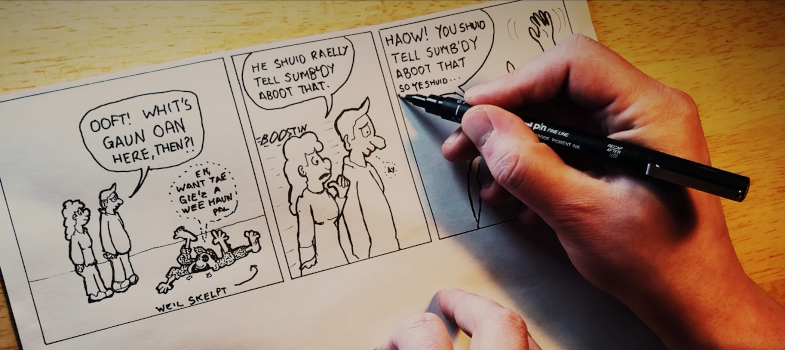Unit 4 Application - Sylvia's Group
Context: S3 English class working within Third and Fourth Level. Before Christmas the class had studied in detail ‘Dulce et Decorum est’ by Wilfred Owen (and had looked more briefly at ‘Base Details’ and ‘Atrocities’ by Siegfried Sassoon). Although the end product was a critical essay on the poem there was a lot of input on the horrors of trench warfare with learners conducting research and engaging with documentary clips and pupils wrote first person ‘diary entry’ accounts of life in the trenches based on their learning.
Scots Lesson: To consolidate learning and provide further depth in a Scottish context, we recently looked at often overlooked Scots war poetry, namely ‘Hey Jock, are ye glad ye listed’ and ‘Mother’ by Neil Munro (sourced from Scots Language Centre website). As a class we broke down the Scots vocabulary in ‘Hey Jock…’ and identified main ideas and messages, making direct comparisons with ideas in ‘Dulce’. This was mainly done in whole-class discussion due to time constraints. For ‘Mother’, pupils used a match-up task and an online dictionary to explore the Scots vocabulary and answered questions on the poem. They then wrote prose imaginative responses, writing a letter from the perspective of the soldier son to the eponymous ‘Mother’ in which they were asked to describe the difficulty of serving on the front line and their feelings and emotions. They were asked to write in Scots as far as possible and were provided with a basic word bank of feelings/emotions and intensifiers (as well as access to online dictionary).
Pupils generally engaged well with the poems and the writing task. Some found the writing challenging – for some it was the requirement to use Scots vocabulary, for a few others it was the idea generation/imaginative aspect – but the work produced was of a good quality. Most pupils commented that they enjoyed the poems and exploring the emotional impact of war on a soldier’s family member but that they preferred the graphic imagery of ‘Dulce’ which they felt is needed to fully explore the horrors of war. I feel some thought I/we had laboured the war topic a bit too much and would’ve preferred to look at a new context!
This is something I would bear in mind in future and would definitely look at the Scots and English poems together (timelines/planning did not permit this this time), probably choosing one of each rather than multiple texts. I think this will be more cohesive and will make the inclusion of Scots perspectives and language a valuable part of the study of war poetry, rather than feel like an addition. I would also look to create some IDL opportunities with the Social Subjects department (staffing issues as well as prelims and folio preparation meant this wasn’t feasible this time).
